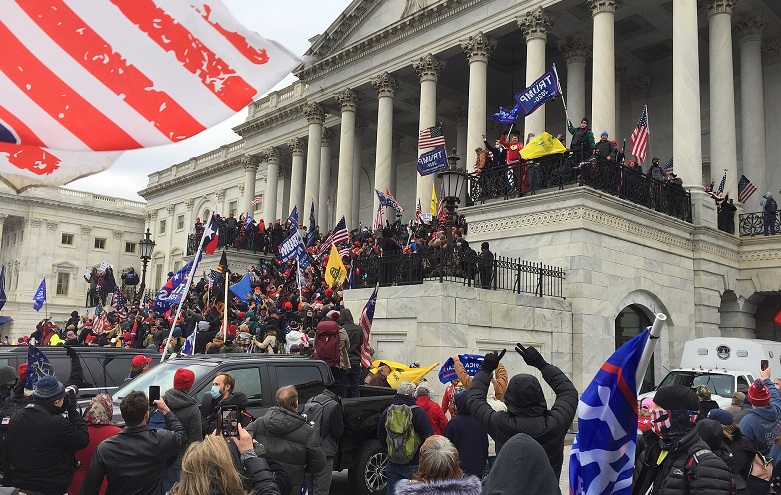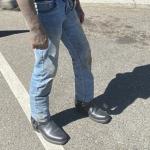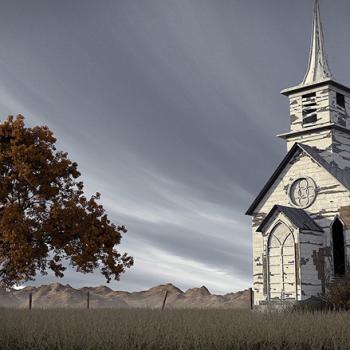January 6 is the new September 11. You don’t even have to say the year—people know what you mean. Here’s what the two have in common:

Like everyone else that September Tuesday (who was old enough to really be aware), I stared in horror at my television screen. I was outraged. I was grief-stricken. I was traumatized. Yes, even though I was safe on my couch in Virginia, far from Ground Zero in New York, the Pentagon, or that Pennsylvania field, I felt traumatized and violated. The United States was under attack, so by extension, I felt assaulted as well. Like everyone else, I glued myself to the TV and watched those images repeatedly. And just like you, I replayed those videos in my dreams night after night.
Preaching on September 15, 2001
At the time, I was pastor of a small country church that expected me to have something to say, the following Sunday morning. Wednesday, Thursday, Friday, and Saturday ticked by as I prayed for guidance. I already had a message prepared—Years before, I had learned not to procrastinate in my sermon writing. But was a message written on September 10 still an appropriate message for a post-9/11 world?
When the morning of the 15th came, I carried with me the manuscript I had written on Monday, the day before the world came crashing down. Through the first half of the service, I continued to pray. “What should I do, God? What can I say to your people?” We collected the offering. We sang the Doxology. The people sat down. And I was on.
I stood in the pulpit, notes in hand for a full sixty seconds as people shuffled in their pews. Somebody coughed. Somebody else stopped unwrapping their hard candy. Then, I stepped down from the pulpit, tore my notes in half, and dropped them to the floor. I took off my coat and tie and sat on the back of the first pew. I faced the people with my feet on the next pew (a no-no, to be sure). And for the rest of the service, we just talked about grief.
Our eyes were red, our voices shaky. Wet tissues joined my notes on the floor. One by one, people told their stories of where they were when they got the news and the things they saw on TV. We expressed their denial, anger, fear, sadness, and vulnerability. By the end of that hour, we were wrecked. But we were better—if just by a tiny margin of God’s grace.
Preaching on January 10, 2021
The Sunday following the Capitol Insurrection, pastors throughout the United States had to figure out what to say. They ascended to their pulpits, or descended to the people, to share the message that they felt God laid on their heavy hearts. The nation was still in the grip of 2020, which included the COVID pandemic, impeachment trial of Donald Trump, stock market crash, tensions surrounding the Black Lives Matter and Blue Lives Matter movements, Chadwick Boseman’s death, West Coast wildfires, RBG’s death, murder hornets, the election of Joe Biden and Kamala Harris as President and VP elect, and controversy over COVID vaccines. Just as they had in the wake of the September 11 attacks, pastors had to figure out what to say. Those who still supported Trump gesticulated and shouted their own holy outrage. Others naming him a criminal pounded their pulpits with righteous indignation.
Now, more than two and a half years later, the world has the clarity of distance from those events. Trump faces indictments, and the world waits to see what will happen. But I will say that in many ways, September 11 and January 6 are the same.
All Americans Under Attack
On both days, the United States was under attack. Democracy was challenged. Americans died, some while doing their jobs to serve and protect our way of life and the rule of law.
On both days, the attack was on more than just the direct target. September 11 saw the deaths of almost 3,000 people, but each of these suffered as part of a larger assault against American democracy. On January 6, five people lost their lives. 138 officers were injured. Four officers died by suicide in the months following the incident. Regardless of the number of lives lost, the same principle applies in both cases. On both September 11 and January 6, it wasn’t just the Twin Towers, Pentagon or Capitol building that were attacked—it was all Americans.
Days That Defined Generations
Both were days that defined generations. In this way, January 6 is the new September 11. Questions pertinent to different generations are: “Where were you when you saw the moon landing? Or when Martin Luther King, Jr. was shot? Or when the Challenger exploded?” A younger generation will identify strongly with the question, “Where were you on September 11?” In the same way (mark my words), the events of January 6 will define this youngest generation. It will not be a day we forget, but a day that history books will record with infamy. These types of news events affect viewers more strongly than you’d think.
Vicarious Trauma
On both days, TV viewers felt traumatized by the things they watched and were filled with shock, horror, fear, grief, and outrage. Vicarious trauma takes place when people witness or learn of traumatizing events, and they feel those events with such empathy that it seems as if it happened to them. Certainly, they are not as traumatized as the people who actually experienced these things, but that does not negate the severe impact that people can have when they feel the trauma of others. It can manifest as feelings of depression, fatigue, shame, self-doubt, bystander guilt, and victimization. These are all very real emotions that you may be experiencing yourself, as you deal with the vicarious trauma of watching the news these days.
It’s Okay Not to Be Okay
Enough people have written their political and social commentaries on the Trump presidency and the events of January 6. They will do so with more poignancy and eloquence than I. As we watch the events of upcoming indictments unfold, history will record the results. As a caretaker of souls, it is not my focus to figure out the politics. It is my goal to ask—are you okay? It’s okay to admit that you aren’t. It’s 2023, and many people still haven’t recovered from 2020—physically, emotionally, psychologically, spiritually, and financially.
So today, just like I did on the Sunday following the Twin Towers attack, I’m just going to sit down with you, and ask–how’re you doing? It’s okay to be angry, frustrated, scared. It’s normal to feel vindictive, horrified or violated. As we watch the upcoming indictments over January 6 events, you’ll likely feel triggered by some of the things you witnessed in 2021. I just hope that you’ll talk with somebody about it. Find a trusted person and wrestle with these emotions together. Ask someone to sit quietly and just listen to how you feel. Take the time to feel the feelings and to talk them out. And help the young people around you to do the same. It affects them even more deeply than it is impacting you.
Four More Years?
Recently at church, someone said to me, “I think that four more years of Donald Trump in the White House would be the best thing for the United States—don’t you agree?” Out of courtesy, I changed the subject. Out of wisdom, I waited to answer his question here. Donald Trump’s incitement of the January 6 insurrection wrought a destruction of the American soul that can only be compared to the events of September 11, 2001.
Whether you’re for or against the former President, you have to agree that if re-elected, he would be the Donald Trump we know—only on steroids! Every second-term President acts more recklessly in their subsequent term than they did in the first. If acquitted or pardoned, he would loose his vengeance on those who opposed him. His victory would prove in his own mind that the American people are completely behind him. And, four years later he would once again refuse to step down.
What Will Define Us?
If we want to see a United States and a world even more traumatized than they are today, then Donald J. Trump would be an ideal choice for President of the United States in 2024. The upcoming indictments will recount the events that followed January 6. Hopefully, the results of the upcoming proceedings will result in his incapacity to be elected in 2024. Twenty years from now, we will remember this time and judge from that vantage point whether we proceeded with wisdom or folly. It is up to us to make history, today. Perhaps it’s not just the events of September 11 and January 6 that will define us—but how we respond to them that will make all the difference.
















